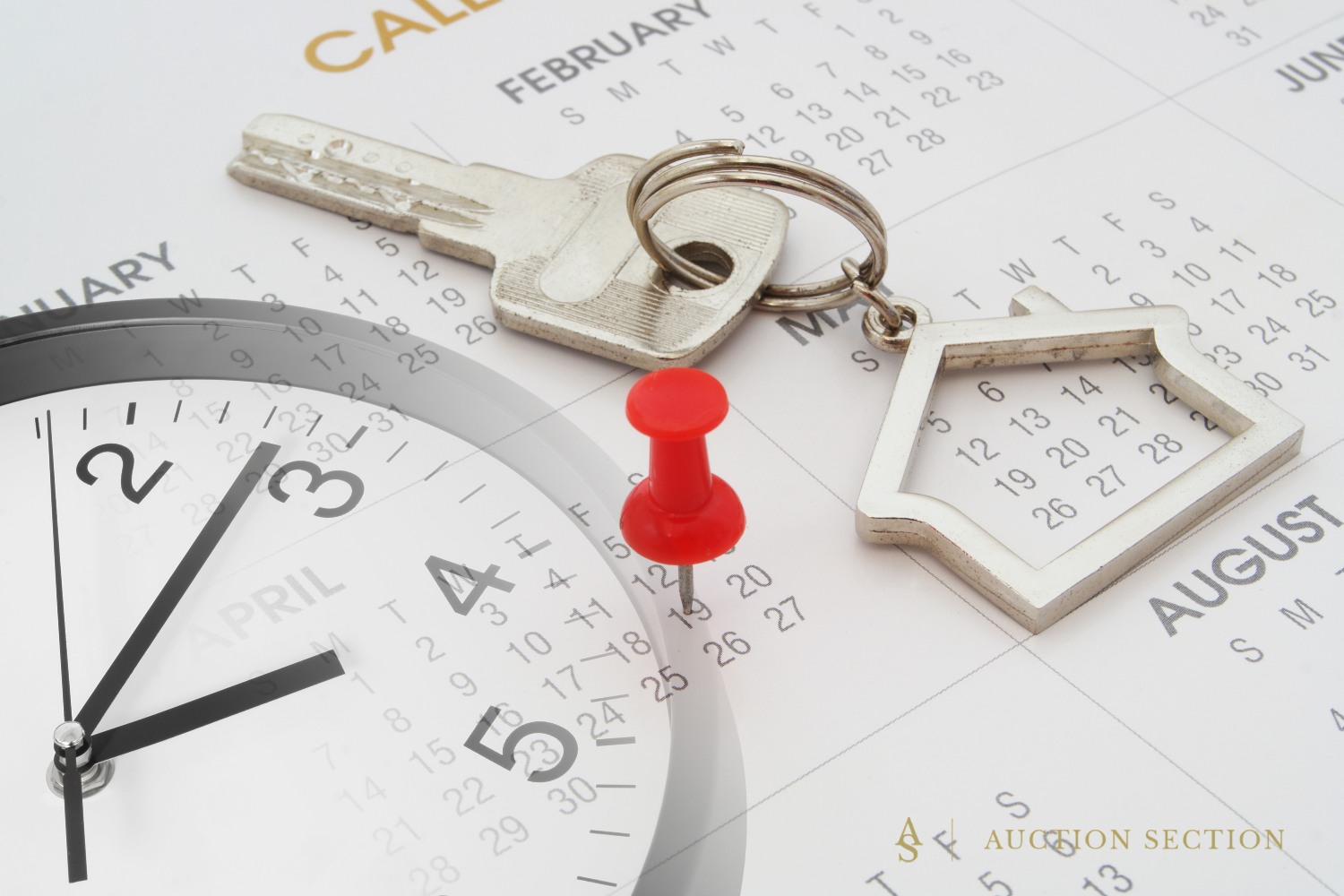
Selling or buying a property the traditional way can be slow and unpredictable. It often takes months of listings, endless negotiations, and uncertain offers, only to end in a collapsed deal or price cut.
This delay not only wastes time but also causes frustration. It drains energy, money, and trust. Sellers may accept less than market value, while buyers miss out on better opportunities due to unclear pricing or last-minute issues.
But there’s a better way. Real estate auctions offer speed, transparency, and a straightforward process, so both buyers and sellers can make confident decisions without delays or doubts.
In this guide, we’ll walk you through how real estate auctions work, their benefits, and how to navigate them successfully, with expert tips and research-backed insights.
What Is a Real Estate Auction and Why Does It Matter
A real estate auction is a public event where buyers place competitive bids on a property. The highest bidder wins, and the sale is legally binding. Unlike traditional sales, there’s no waiting, no guessing, just a fast, transparent, and secure transaction.
AuctionSection calls this process “transparent and expedient,” enabling sellers to close deals quickly and providing buyers with fair access to real market value.
Why It Matters:
- Faster Sales: Properties typically sell within a set timeframe, usually 30 days or less.
- No Guesswork: Transparent bidding shows actual market demand.
- Serious Buyers: Only qualified, committed bidders participate.
- Legally Secure: Once sold, the contract is final, with no last-minute dropouts.
- Fair Market Value: Competitive bidding helps achieve the best price.
Why Choose Auction? Top Benefits
Real estate auctions offer more than just speed; they create transparency, competition, and legal security for both sellers and buyers. Here’s why more property owners are choosing auctions over traditional listings:
- Quick Closings: Auctions typically complete within 6-8 weeks, from listing to final settlement: no lengthy negotiations or endless waiting periods.
- Transparent Pricing: Every bid is visible in real-time, providing buyers with Clarity and sellers with a clear view of actual market demand.
- Higher Sale Prices: A landmark study across five Australian cities found that homes sold at auction fetched higher prices than private sales, even after adjusting for selection bias. In Melbourne, properties sold at auction averaged AUD 200,000 more than private listings in 2019
- Growing Market Trend: Auction sales have nearly doubled over the past decade. In 2021, over 17.6% of homes in Australian capital cities were sold via auction.
- Legal Certainty: Once the hammer falls, the sale is final and legally binding. That means no renegotiation, no walk-aways, and no delays, giving both sides confidence in the deal.
How Auctions Work | Seller’s Perspective
Selling through auction may seem complex, but the process is smooth when handled by professionals like AuctionSection. Here’s a detailed breakdown of what sellers can expect:
1. Auction Preparation & Legal Pack
Before listing, the seller works with the auction team to gather key documents and define sale terms. This includes:
- Title deed and property ownership documents
- Zoning reports, surveys, and disclosures
- Setting the auction type (absolute, reserve, or minimum bid)
- Deciding on the reserve price (if any), buyer’s premium, and deposit amount (typically 5-10%)
- Setting a fixed closing period (usually within 28-30 days)
Having a comprehensive legal pack builds buyer confidence and prevents delays after the auction.
2. High-Impact Marketing Campaign
AuctionSection crafts aggressive, time-sensitive marketing campaigns to attract serious buyers fast. This often includes:
- Listings on high-traffic real estate platforms
- Geo-targeted digital ads and social media promotion
- Email marketing to investor databases
- Professional photography, floor plans, and video walkthroughs
- Optional virtual open houses
This urgency and visibility help generate maximum interest in a short time.
3. Auction Day: Transparent and Timed
The auction is conducted in-person, online, or both (hybrid), with a licensed auctioneer managing bids. Key points:
- All bidders are registered and verified in advance.
- The auction follows strict rules: no hidden offers or off-record deals.
- If the reserve is met, the property is sold immediately to the highest bidder.
- If not, post-auction negotiations may follow
4. Post-Auction Settlement
Once the auction concludes:
- The winning bidder pays a deposit immediately (usually 5-10%)
- Contracts are signed on the same day.
- The remaining balance is paid within the agreed timeline (commonly 28 days)
- AuctionSection coordinates the legal transfer of ownership between buyer and seller.
This structured process ensures a fast and secure transaction with minimal disruption for the seller.
How Auctions Work: Buyer’s Perspective
For buyers, auctions offer opportunity, speed, and competition. But success depends on preparation and clear understanding. Here’s how to navigate it step by step:
1. Prepare Early: Do Your Homework
Before bidding, buyers should:
- Review the auction listing and study the full legal pack
- Visit the property during open viewing windows.
- Hire a surveyor or solicitor if needed.
- Understand all terms and conditions, especially the deposit and closing timelines.
This helps you avoid surprises and make informed decisions.
2. Secure Your Finances
Unlike traditional purchases, auctions move fast. You must be financially ready. That includes:
- Getting mortgage pre-approval or
- Having proof of available funds for a cash purchase
- Knowing the buyer’s premium (often 5-12%) and factoring that into your total budget.
Failure to pay on time can result in the loss of the deposit or legal action.
3. Register to Bid
Bidding requires pre-registration with the auction house. You’ll need to:
- Provide valid ID and proof of funds
- Agree to auction terms.
- Pay a small holding deposit (varies)
- Choose whether to bid in person or online.
Once approved, you’ll receive a bidder number or login credentials.
4. Bid Intelligently
On auction day:
- Watch the pace of bidding, and don’t rush
- Stay within your limit and place a maximum bid before the auction.
- Remember: the buyer’s premium is added to your winning bid.
- Once your bid wins, the sale is immediately binding.
There’s no room for second thoughts, so bid confidently but carefully.
5. Close the Deal
If you win:
- Pay the required deposit immediately (5-10%)
- Complete the paperwork on the same day.
- Settle the remaining amount within the stated timeframe (typically 28 days)
- Legal teams manage escrow and title transfers.
Failure to meet deadlines can void the deal and result in financial penalties.
Pros and Cons of Real Estate Auctions
Real estate auctions offer numerous advantages, but they also require prompt decisions and thorough preparation. Here’s a quick look at the key pros and cons for both buyers and sellers.
For Buyers:
Pros
- Fast closings with no lengthy negotiations
- Transparent bidding and fair competition
- Access to unique or discounted properties
Cons
- Short time to inspect and decide
- Properties sold “as-is,” with no repairs
- There is no cooling-off period; the sale is final once it is won.
For Sellers:
Pros
- Quick, secure sales with fixed timelines
- Attracts serious, ready-to-buy bidders
- Open bidding can raise the final price
Cons
- There is no guarantee of high bids without a reserve.
- Upfront costs for marketing and legal prep
- Less flexibility once the auction begins
Auction vs. Private Sale: Evidence & Insights
| Category | Auction Sale | Private Sale |
| Pricing Clarity | Transparent bidding shows real-time demand and market value | Pricing is private and negotiable, often leading to low-ball offers |
| Sale Price | Auctions often achieve 6-10% higher sale prices, up to AUD 200K more in Melbourne. | Sellers may have to lower prices during private negotiations |
| Timeline | Quick and fixed, most auctions close within 28-30 days | It can drag on for months with buyer dropouts or delayed financing |
| Buyer Confidence | Bidders see each other’s offers, no hidden deals | No price visibility; offers are made behind closed doors |
| Contract Terms | Terms are fixed and not open to negotiation | With flexible terms, buyers and sellers can adjust price, conditions, and dates |
| Legal Security | The sale becomes legally binding once the hammer falls | Buyers often have cooling-off periods or may withdraw after signing |
| Inspection Time | Limited time before the auction to inspect and decide | More time for property inspections and professional evaluations |
Auction Types & Formats
Understanding the different auction formats helps sellers choose the right strategy and prepares buyers to bid with confidence. Below are the most common types of real estate auctions:
Absolute Auction
- There is no reserve price; the property sells to the highest bidder, regardless of the final bid amount.
- It is ideal for motivated sellers seeking a quick and definite sale.
- Creates high competition and buyer urgency.
Reserve Auction
- The seller sets a private minimum price (the reserve).
- The property only sells if bidding reaches or exceeds that amount.
- Offers more control to sellers while still allowing competitive bidding.
Minimum Bid Auction
- The auction opens at a publicly announced starting price.
- Bidding starts at that minimum, but the final sale is not guaranteed unless the reserve terms are met (if applicable).
- It helps attract more bidders by signaling affordability upfront.
Online or Hybrid Auction
- Combining live in-person bidding with online participation.
- Increases reach and flexibility for both local and international buyers.
- A popular format for modern real estate auctions, especially post-COVID.
Expert Tips for Sellers
- Choose an auction type with clear goals, absolute speed, and reserve for protection.
- Prepare legal packs early.
- Use strategic marketing, emphasize urgency, and highlight key features.
- Consider adding video tours and virtual walkthroughs to enhance your online presence and engage your audience.
Expert Tips for Buyers
- Inspect early and hire professionals.
- Set a firm max, including the buyer’s premium.
- Familiarize yourself with the bidding process by observing one first.
- Stick to your limit; don’t let emotion drive you.
AuctionSection’s Edge
- Proven Success: High sale completion rates and fast closings.
- Experienced Team: Mark & Logan Thomas bring deep Texas market expertise.
- Tech-Savvy Approach: Hybrid auctions, virtual tours, and precise documentation.
- Full-Service Support: Handling legal, marketing, and settlement, start to finish.
Frequently Asked Questions
Yes, but you must have pre-approved financing or proof of funds ready before auction day. Auctions move fast, and you’ll need to settle within a short, fixed period, usually 28-30 days.
It’s an additional fee (typically 5-12%) added to the winning bid. This covers auction-related costs and is paid by the buyer at settlement; always factor it into your total budget.
Yes, most auction properties offer scheduled inspections before the sale. You should also review the legal pack in detail, ideally with a solicitor or advisor.
If bidding doesn’t reach the seller’s reserve, the property might be withdrawn. However, the seller may choose to negotiate directly with the highest bidder after the auction has concluded.
If you fail to complete the payment, you’ll lose your deposit and could face legal penalties under the binding contract. Always be financially prepared before bidding.
Why Auctions Work And Why You Should Act Now
Real estate auctions offer more than just speed; they provide clarity, competition, and control. Sellers benefit from faster, legally binding sales. Buyers get transparency and real-time pricing with fewer delays and no hidden negotiations.
At AuctionSection, we combine cutting-edge marketing, legal guidance, and digital tools to make real estate auctions efficient and successful for everyone involved.
If you’re in Texas and want results without the guesswork, explore how our expert team can help you sell or buy through auction with confidence.
Contact us for professional real estate auction services in Texas.


